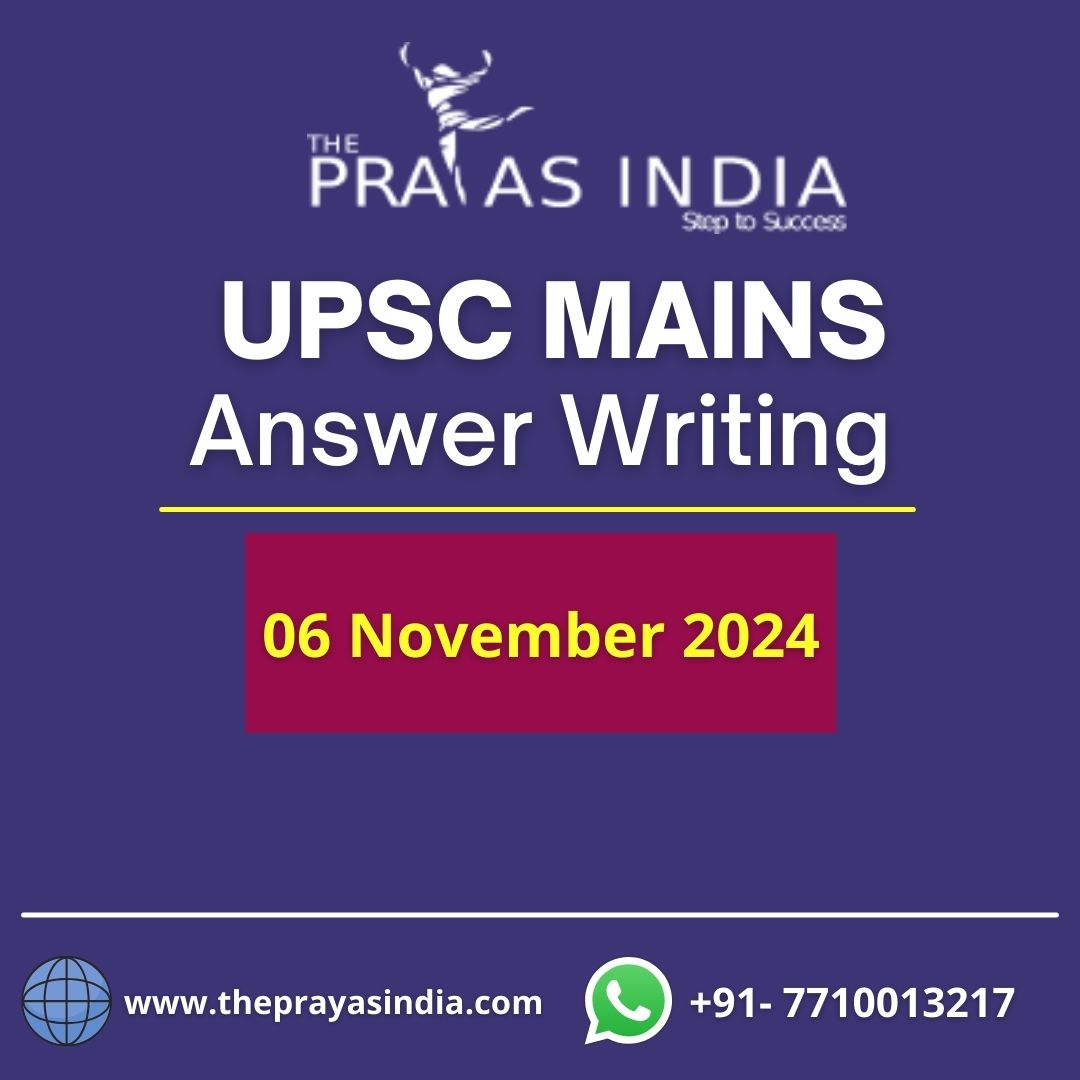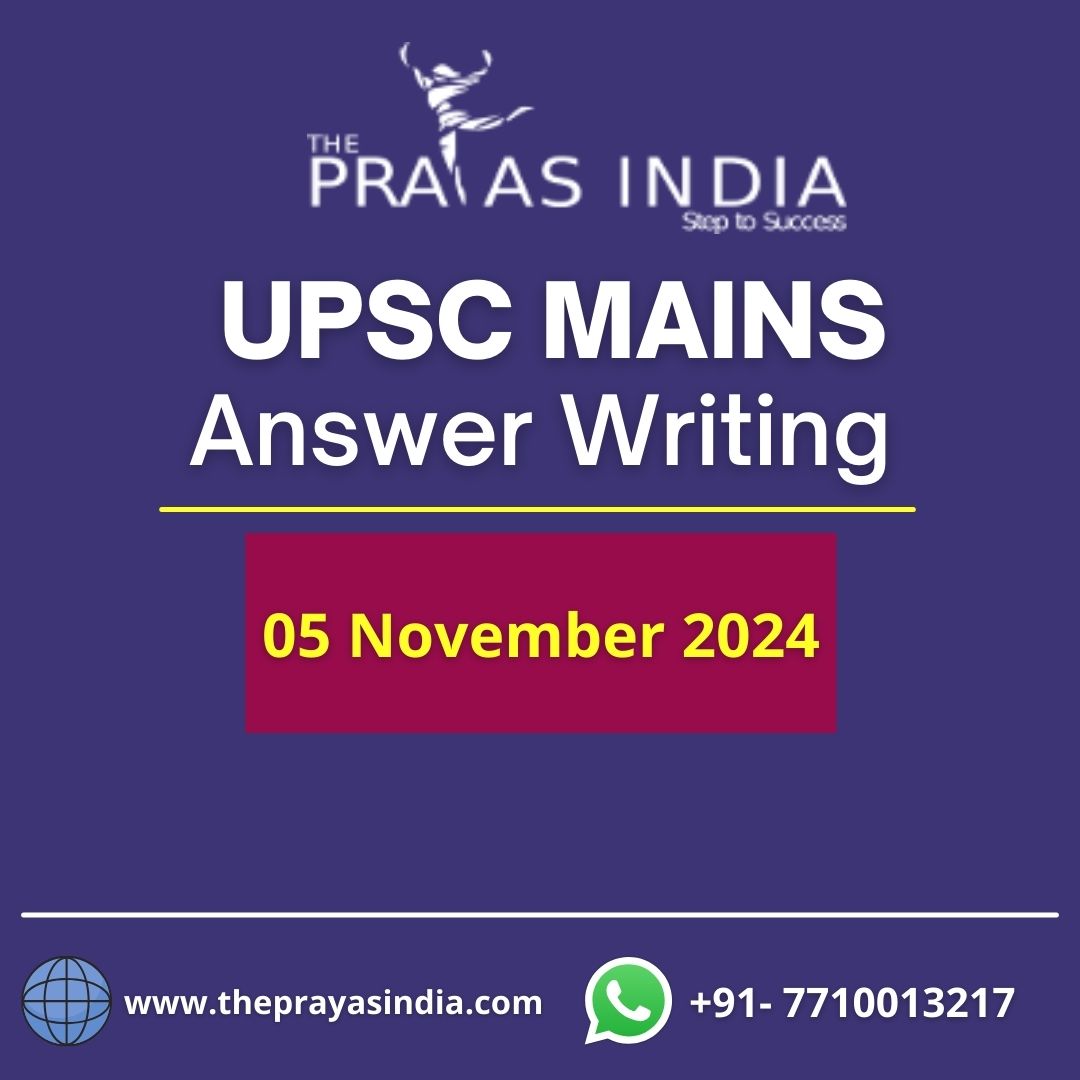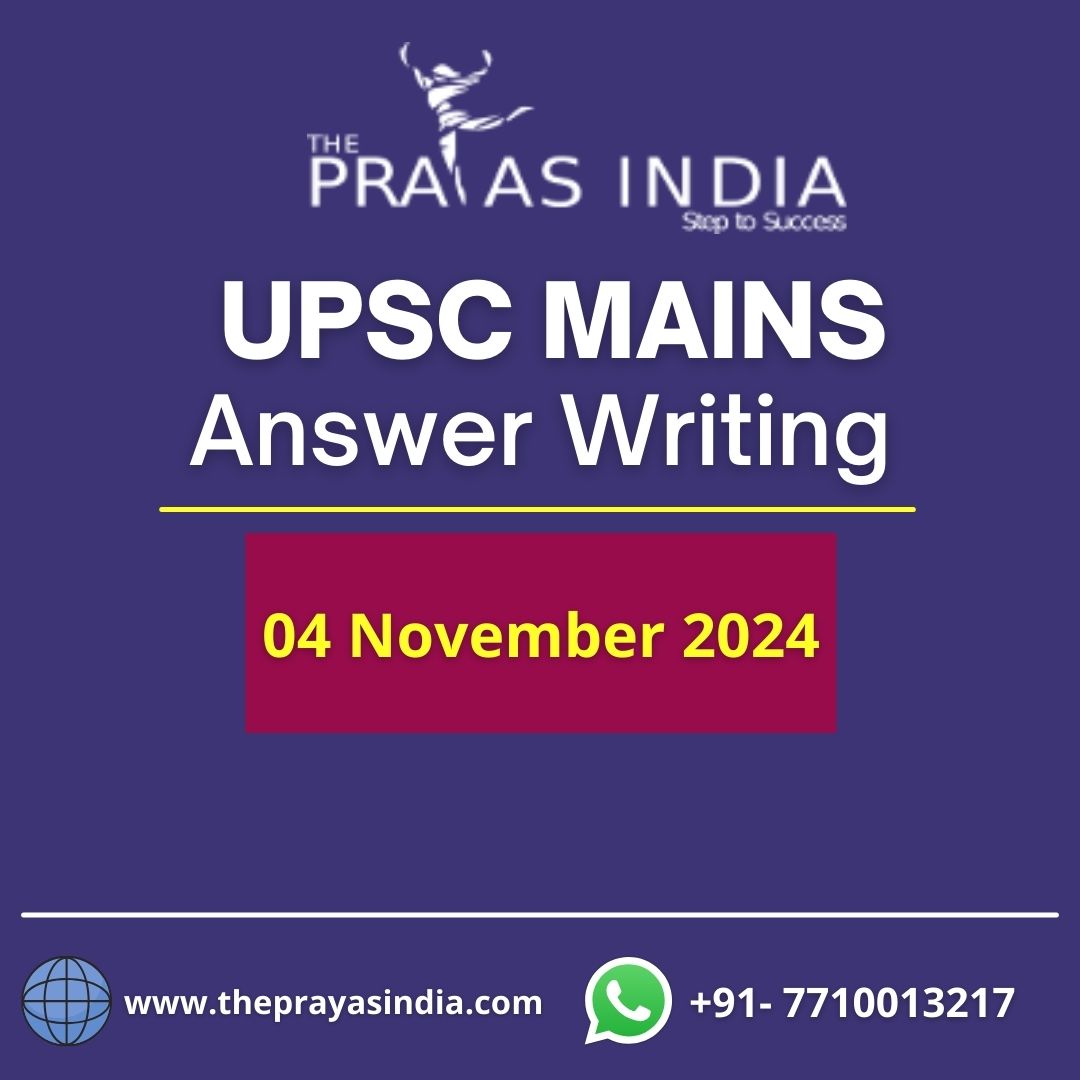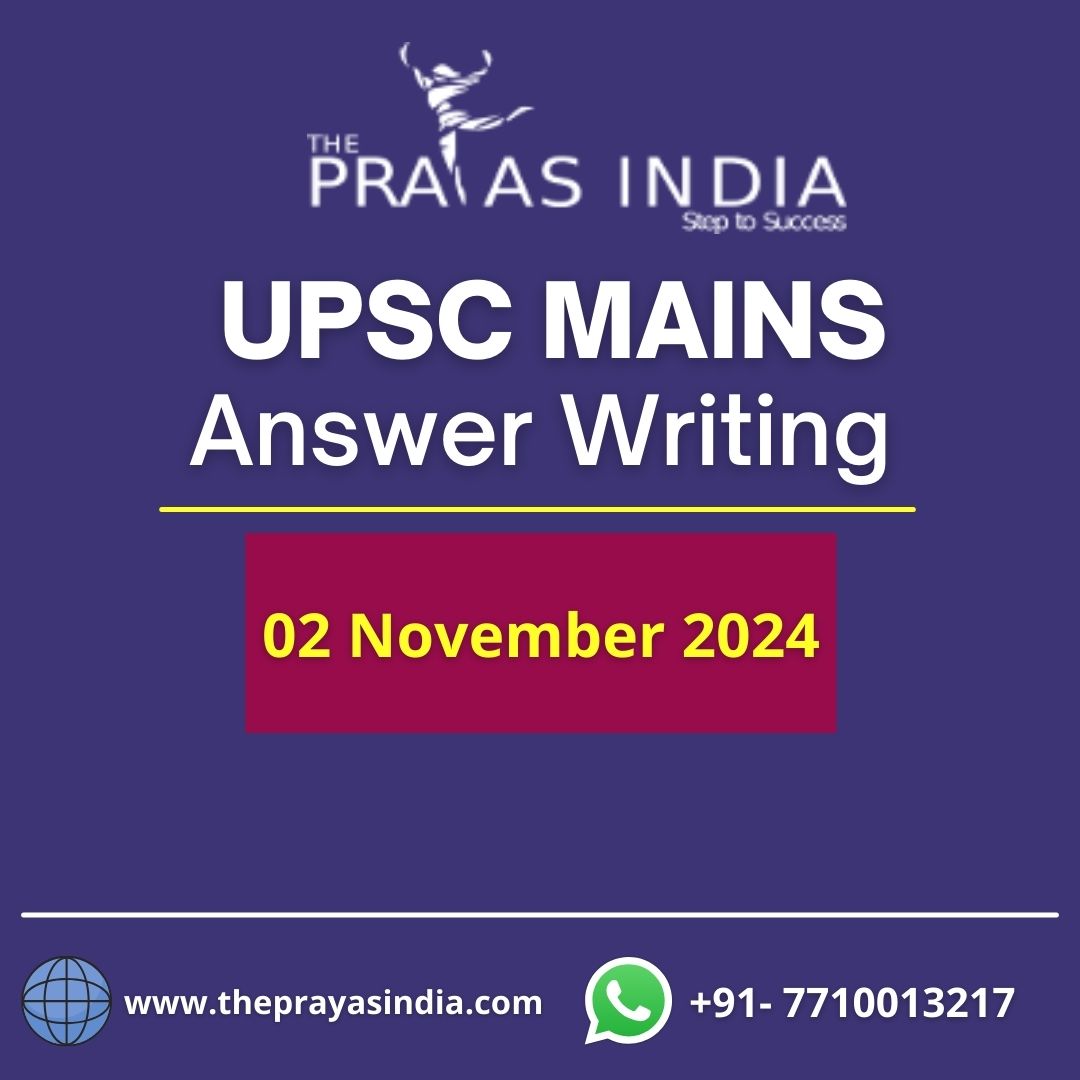MAINS DAILY QUESTIONS & MODEL ANSWERS
Q1. In India, the growth of modern nationalism is intimately connected to the anti-colonial movement. People began discovering their unity in the process of their struggle with colonialism. Examine.
GS I – Modern Indian History
Introduction:
- Indian Nationalist Movement was a grand and prolonged struggle launched against British imperialism. Nationalism was the main ideology and the instrument with whose help this struggle was launched.
- In the context of the Indian Nationalist Movement, Indian nationalism represented two major ideas: anti-imperialism and national unity. In other words, any person, movement or organisation that practised and upheld these two ideas, could be considered a nationalist.
- The rise and growth of Indian nationalism was the response generated by the British government through the creation of a new institution, new opportunities and new style allocation of resources as well as a worldwide upsurge of the concepts of nationalism initiated by the French Revolution.
Factors responsible for the growth of Modern Nationalism during British rule:
- Political and administrative divide:Partition of Bengal in 1905, carried out by the British viceroy, Lord Curzon.
- Political Unity: For the first time, most of the regions in India were united politically and administratively under a single power (the British rule). It introduced a uniform system of law and government.
- Development of Communication and Transport: The introduction of railways, telegraphs and postal services and the construction of roads and canals facilitated communication among the people. All these brought Indians nearer to each other and provided the facility to organise the national movement on an all-India basis.
- English Language and Western Education: The English language played an important role in the growth of nationalism in the country. The English educated Indians, who led the national movement, developed Indian nationalism and organised it. Western education facilitated the spread of the concepts of liberty, equality, freedom and nationalism and sowed the seeds of nationalism.
- The Role of the Press: The Indian Press, both English and vernacular, had also aroused the national consciousness.
- Social and Religious Movements of the Nineteenth Century: The leaders of various organisations like the Brahmo Samaj, Ramakrishna Mission, Arya Samaj, and Theosophical Society generated a feeling of regard for and pride in the motherland.
- Economic Exploitation by the British: A good deal of anti-British feeling was created by the economic policy pursued by the British government in India. The English systematically ruined the Indian trade and native industries. Therefore, economic exploitation by the British was one of the most important causes for the rise of Indian nationalism.
- Revolt of 1857: The Revolt of 1857 created a kind of permanent bitterness and suspicion between the British and the Indians. The English feeling of racial superiority grew. India as a nation and Indians as individuals were subjected to insults, humiliation and contemptuous treatment.
- Administration of Lytton: Lord Lytton arranged the Delhi Durbar at a time when the larger part of India was in the grip of famine. He passed the Vernacular Press Act which curbed the liberty of the Indian Press. His Arms Act was a means to prevent the Indians from keeping arms. All these measures created widespread discontent among the Indians.
- The Ilbert Bill controversy: The Ilbert Bill was presented in the Central Legislature during the Viceroyalty of Lord Ripon. The Bill tried to remove racial inequality between Indian and European judges in courts. This Bill was opposed by the British residents in India. Ultimately the Bill was modified.
- Role of Western Thought and Education:The modern education played an important role in awakening of Indian political thinking because it assimilates the modern western ideas. The British introduces modern education to educate a small section of upper and middle classes to create a class “Indian in blood and colour, but English in taste” who would act as interpreters between the Government and the masses.
- Racial Antagonism: The Englishmen considered themselves as superior in all respects than the Indians. They never wanted to offer the Indians higher jobs even though they were qualified and intelligent. The age limit for Indian Civil Service Examination was kept at twenty-one and the examination was held at England.
Indian Nationalism succeeded and is unique because of its various peculiarities:
- A Cosmic Vision: The framework of Indian culture places human beings in the centre of the universe, as a divine creation-which celebrates Individuality and differences of opinion in the society.
- Sense of Harmony: Indian philosophy and culture tries to achieve an innate harmony and order in the society.
- Tolerance: In India, tolerance and liberalism is found for all religions, castes, communities, etc. Indian society accepted and respected Shaka, Huna, Scythians, Muslim, Christian, Jews and Zoroastrians. Rulers like Ashoka, Akbar have patronized various religions and ensured that there is peaceful co-existence of religions.
- Continuity and Stability: The light of ancient Indian culture life is yet glowing. Many invasions occurred, many rulers changed, many laws were passed but even today, the traditional institutions, religion, epics, literature, philosophy, traditions, etc. are alive.
- Adaptability: Adaptability is the process of changing according to time, place and period. Indian society has shown fluidity and has adjusted itself with changing times.
- Caste System and Hierarchy: Indian Society has evolved systems of social stratification, which in the past helped in accommodating outsiders, but concomitantly it has also been the reason for discrimination and prejudice.
- Unity in diversity: Despite inherent difference Indian society celebrates unity in diversity which reflects in modern India’s founding principles and constitutional ideals.
- British rule was largely responsible for a new awakening among the Indians. The collective impact of British rule and enlightenment of Indians led to increased nationalist feeling.
Q2. During its first twenty years the Congress made moderate demands. The members placed their demands before the Government always in the form of petitions and worked within the framework of law. Do you think that the moderate phase of the national movement must be considered a failure? Critically analyze.
GS I – Modern Indian History
Introduction:
- The moderates contributed significantly in Indian freedom struggle. The main objective of the Moderates was to achieve self-government within the British Empire. They followed a middle path and not an extreme path against British Empire.
Nature of the Moderate Phase:
Political demands of the moderates were moderate:
- From 1885 to 1892, their main demand continued to be expansion and reform of the Legislative Councils, the membership of the Councils for elected representatives of the people and also an increase in the powers of these Councils.
- Holding the ICS exam in India along with England to allow more Indians the opportunity to take part in the administration.
- the separation of the Judiciary from the executive
- Freedom of speech and expression.
- Freedom to form associations.
- Repealing the Arms Act of 1878.
- Increasing spending on education of Indians.
However, Economic demands of moderates were radical:
- The most notable part of Moderates political work was their systematic and factual criticism of the economic policy of British rule through press and publication.
- The focal point of the nationalist critique of colonialism was the drain theory. For instance, Dadabhai Naoroji put forward the idea that Britain was draining and ‘bleeding’ India.
- Other nationalist leaders, journalists and propagandists followed in the foot-steps of Dadabhai Naoroji. R.C. Dutt, for example, made the drain the major theme of his Economic History of India.
- They demanded Indian control over the public purse and raised the slogan that had earlier been raised by the Americans during their War of Independence, ‘No taxation without representation’.
- Moderates strictly demanded to reduce the military expenditure and increase the allocation of money for activities such as health and education.
- They demanded the reduction of land revenue and abolition of the salt tax and supported the imposition of income tax and import duties on products which the rich and the middle classes consumed.
- Dadabhai Naoroji in his famous economic critique ‘Poverty and un-British rule in India’ popularly put it, foreign capital represented the ‘despoilation’ and ‘exploitation’ of Indian resources.
- Similarly, the editor of the Hindustan Review and Kayastha Samachar described the use of foreign capital as ‘a system of international depradation’.
- They demanded for the development and protection of Indian Industries through increased tariffs on imports and government aid for these industries.
- After seeing the failure of the Government in this regard the nationalists popularised the idea of Swadeshi or use of Indian goods and boycott of British goods as a means of promoting Indian industries.
- An enquiry into India’s growing poverty and famines.
- They organized powerful intellectual agitations against nearly all the important official economic policies. They used these agitations to both understand and to explain to others the basis of these policies in the colonial structure.
Limitations of Moderate phase:
- However British rule, to most of them seemed to be an act of providence destined to bring in modernization.
- The moderate politicians could not or did not organize an agitation against British rule because of them still shred an intrinsic faith in the English democratic liberal political tradition.
- Their politics was very limited in terms of goals and methods. They were secular in their attitudes, though not always forthright enough to rise above their sectarian interests. They were conscious of the exploitative nature of British rule, but wanted its reforms and not expulsion.
- They equated liberty with class privilege and wanted gradual or piecemeal reforms.
- Early Congressman had an implicit faith in the efficacy of peaceful and constitutional agitation as opposed to popular mean of agitation.
- The movement was confined to the educated classes only. Did not try to employ the masses.
- Believed in Petition, Prayer and Protest. They did not go for mass mobilisation. The basic weakness of the early national movement lay in its narrow social base. It did not penetrate down to the masses. In fact, the leaders lacked faith in the masses.
- Their immediate demand was not for full self-government or democracy. They demanded democratic rights only for the educated members of the Indian society, who would substitute for the masses.
However, Moderate phase was not a complete failure:
- The moderates led by Dadabhai Naoroji, R.C. Dutt, Dinshaw Wacha and others, analysed the political economy of British rule in India, and put forward the “drain theory” to explain British exploitation of India.
- Moderates were able to create an all-India public opinion that British rule in India was the major cause of India’s poverty and economic backwardness. The moderates demanded reduction in land revenue, abolition of salt tax, improvement in working conditions of plantation labour, etc.
- They helped in expansion of council’s i.e. greater participation of Indians in councils and helped in reform of councils i.e. more powers to councils, especially greater control over finances.
- The early nationalists worked with the long-term objective of a democratic self-government.
- They campaigned for General Administrative Reforms. They demanded and put pressure on British Empire on Indianisation of government service on the economic grounds.
- They asked and contributed in Separation of judicial from executive functions.
They criticised:
- Oppressive and tyrannical bureaucracy and an expensive and time-consuming judicial system.
- Aggressive foreign policy which resulted in annexation of Burma, attack on Afghanistan and suppression of tribals in the North-West.
- Increase in expenditure on welfare, education, especially elementary and technical, irrigation works and improvement of agriculture, agricultural banks for cultivators etc.
- They fought for civil rights including the right to speech, thought, association and a free press. Through campaigns, the nationalists were able to spread modern democratic ideas, and soon the defence of civil rights became an integral part of the freedom struggle.
- The nationalists were, thus, able to build a national movement while undermining the political and moral influence of imperialist rule. This helped in generating anti-imperialist sentiments among the public. But, at the same time, the nationalists failed to widen the democratic base of the movement by not including the masses, especially women, and not demanding the right to vote for all.




